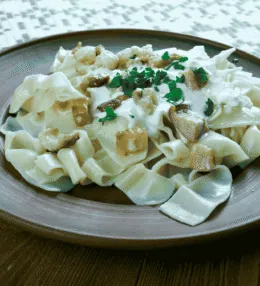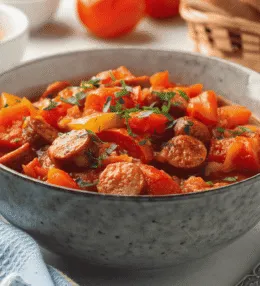
- View
Table of Contents
ToggleGumbo is one of those dishes that instantly calls to mind the soulful, layered cooking of Louisiana. It’s not just food, it’s culture in a bowl. Thick, spicy, and deeply savoury, gumbo brings together the diverse culinary influences that define the American South, particularly Creole and Cajun traditions.
What makes gumbo stand out is how it reflects the spirit of the region. It’s bold, it’s complex, and every pot tells its own story. Served over white rice, gumbo is a hearty stew that’s often enjoyed at family gatherings, festivals, and quiet Sunday dinners. It’s comfort with character.
Want to dive deeper into American Cuisine? Don’t miss our post on 65 Traditional American Foods to Try
What Is Gumbo?
Gumbo is a slow cooked stew made with a richly flavoured stock and thickened with either a dark roux, okra, or filé powder. From seafood and chicken to smoked sausage and vegetables, the ingredients vary by region and tradition, but the essence remains the same.
This dish is often described as a melting pot in both flavour and heritage. Cajun gumbo typically features a darker roux and meat, while Creole versions lean towards tomatoes and seafood. Either way, it’s the type of meal that makes you slow down and savour each bite.
Ingredients and Taste
At the heart of gumbo is the roux, a slow mix of flour and fat, stirred patiently until it turns a deep brown. This forms the base for a stew packed with layers of taste and texture. Add the “holy trinity” of Louisiana cooking: onions, bell peppers, and celery.
From there, the recipe opens up. Some include smoky andouille sausage and tender chicken thighs. Others highlight the brininess of shrimp or crab. A blend of spices gives gumbo its signature heat, but it’s never just about fire, it’s about balance and boldness.
The finished dish is rich and comforting with a depth that keeps revealing itself. The roux gives it a toasted, nutty base while the vegetables and spices bring it to life. A spoonful of gumbo over rice is warm, hearty, and deeply satisfying with every bite.
A Taste of History
Gumbo’s roots run deep, stretching back to the colonial period of Louisiana. It’s a dish born of necessity, creativity, and cultural convergence. French, Spanish, African, and Native American influences all play a part in shaping what gumbo has become today.
The name itself may come from the West African word for okra, “ki ngombo,” a nod to one of the early thickening agents. French settlers brought roux, while Native Americans contributed filé powder made from sassafras leaves. Over time, gumbo absorbed each element and made it its own.
By the nineteenth century, gumbo had become a staple across Louisiana kitchens, from the bayous to the big houses. It’s a dish that’s evolved with the people who cook it, adapting to what’s available while keeping its soul intact. Few dishes carry history quite like gumbo does.
Whether you’re dipping into a seafood version on the Gulf Coast or tasting a smoky chicken and sausage variety inland, gumbo captures a sense of place. It’s more than a meal, it’s a reminder that food can be as complex and beautiful as the culture that creates it.
How to Make Traditional Cajun Gumbo (Spicy Stew)
Cajun gumbo is a deep, smoky stew from Louisiana, built patiently on a chocolate coloured roux and layered with spice, tender meat and the classic aromatic trio of onion, celery and green pepper. It rewards time, stirring and bold taste. See the recipe card at the bottom for printable directions
Ingredients
For the Roux
- 80g plain flour
- 80ml vegetable oil
Vegetables
- 1 medium onion, finely chopped
- 1 green bell pepper, chopped
- 2 celery stalks, chopped
- 3 garlic cloves, minced
Seasonings
- 2 bay leaves
- 1 tsp dried thyme
- 1 tsp smoked paprika
- ½ tsp cayenne pepper (adjust to taste)
- ¾ tsp salt
- ½ tsp black pepper
Proteins
- 200g andouille sausage, sliced
- 250g boneless chicken thighs, diced
- 200g raw prawns, peeled and deveined
Liquid and Thickener
- 1 litre chicken stock
- 1 tsp filé powder (optional)
To Finish
- Cooked white rice
- Fresh parsley, chopped
- Spring onions, sliced
Cooking Instructions
Step 1: Prepare the Roux
In a large heavy pot, whisk together the flour and oil over medium heat. Stir continuously for 20 to 25 minutes until it darkens to a chocolate brown colour. This roux is the heart of the gumbo. Keep stirring with patience and care to avoid burning.
Step 2: Sauté the Vegetables
Add the chopped onion, bell pepper and celery to the roux. Stir and cook for 5 minutes until the vegetables soften. Add the garlic and cook for 1 minute more. This mixture is known as the holy trinity in Cajun cuisine.
Step 3: Add the Seasonings
Stir in the bay leaves, thyme, paprika, cayenne, salt and black pepper. Mix well and cook for 2 minutes to allow the flavours to develop and blend into the base.
Step 4: Brown the Meats
In a separate frying pan, brown the sausage slices on both sides until caramelised. Remove and set aside. In the same pan, brown the chicken pieces until golden. Browning adds essential flavour, so do not skip this step.
Step 5: Simmer the Base
Add the browned sausage and chicken to the gumbo pot. Pour in the chicken stock and stir to combine. Bring the mixture to a gentle boil, then reduce to a low simmer and cook uncovered for 45 minutes. Stir occasionally to prevent sticking.
Step 6: Add the Prawns
Once the gumbo has simmered and thickened slightly, stir in the prawns. Cook for 5 to 7 minutes until they are pink and just firm. Do not overcook or they will become tough.
Step 7: Stir in Filé Powder (Optional)
If using filé powder, stir it in now and cook for 2 to 3 minutes more. Filé adds a slight earthiness and thickens the gumbo gently. Do not boil after adding it.
Step 8: Taste and Adjust
Taste your gumbo and adjust the seasoning if needed. You may want a pinch more salt, a sprinkle of cayenne or another dash of thyme. Let the gumbo sit for 10 minutes to settle before serving.
Step 9: For Serving
Ladle the gumbo over hot cooked rice in shallow bowls. Sprinkle each portion with chopped parsley and sliced spring onions for a fresh finish and contrast.
Final Step: Serve with Style
Serve your gumbo hot, with a piece of crusty bread or cornbread on the side. Place hot sauce on the table for those who like an extra punch. Gumbo tastes even better the next day, so feel free to make it ahead.
Cooking Tips for Perfect Cajun Gumbo
- Stir the roux without pause to prevent it from burning
- Use a cast iron or thick based pot for steady heat
- Brown meats separately to layer savoury flavour
- Simmer uncovered for better texture and flavour concentration
- Add filé only at the end and never boil it
- Let it rest for 10 minutes before serving to deepen the taste

Cajun Shrimp & Sausage Gumbo (Spicy Stew)
Demhaj JuniorIngredients
For the Roux
- 80 g plain flour
- 80 ml vegetable oil
Vegetables
- 1 medium onion finely chopped
- 1 green bell pepper chopped
- 2 celery stalks chopped
- 3 garlic cloves minced
Seasonings
- 2 bay leaves
- 1 tsp dried thyme
- 1 tsp smoked paprika
- ½ tsp cayenne pepper adjust to taste
- ¾ tsp salt
- ½ tsp black pepper
Proteins
- 200 g andouille sausage sliced
- 250 g boneless chicken thighs diced
- 200 g raw prawns peeled and deveined
Liquid and Thickener
- 1 litre chicken stock
- 1 tsp filé powder optional
To Finish
- Cooked white rice
- Fresh parsley chopped
- Spring onions sliced
Instructions
- In a large heavy pot, whisk together the flour and oil over medium heat. Stir continuously for 20 to 25 minutes until it darkens to a chocolate brown colour. This roux is the heart of the gumbo. Keep stirring with patience and care to avoid burning.
- Add the chopped onion, bell pepper and celery to the roux. Stir and cook for 5 minutes until the vegetables soften. Add the garlic and cook for 1 minute more. This mixture is known as the holy trinity in Cajun cuisine.
- Stir in the bay leaves, thyme, paprika, cayenne, salt and black pepper. Mix well and cook for 2 minutes to allow the flavours to develop and blend into the base.
- In a separate frying pan, brown the sausage slices on both sides until caramelised. Remove and set aside. In the same pan, brown the chicken pieces until golden. Browning adds essential flavour, so do not skip this step.
- Add the browned sausage and chicken to the gumbo pot. Pour in the chicken stock and stir to combine. Bring the mixture to a gentle boil, then reduce to a low simmer and cook uncovered for 45 minutes. Stir occasionally to prevent sticking.
- Once the gumbo has simmered and thickened slightly, stir in the prawns. Cook for 5 to 7 minutes until they are pink and just firm. Do not overcook or they will become tough.
- If using filé powder, stir it in now and cook for 2 to 3 minutes more. Filé adds a slight earthiness and thickens the gumbo gently. Do not boil after adding it.
- Taste your gumbo and adjust the seasoning if needed. You may want a pinch more salt, a sprinkle of cayenne or another dash of thyme. Let the gumbo sit for 10 minutes to settle before serving.
- Ladle the gumbo over hot cooked rice in shallow bowls. Sprinkle each portion with chopped parsley and sliced spring onions for a fresh finish and contrast.
- Serve your gumbo hot, with a piece of crusty bread or cornbread on the side. Place hot sauce on the table for those who like an extra punch. Gumbo tastes even better the next day, so feel free to make it ahead.
Nutrition
Demhaj Junior
Demhaj Junior is the founder of DelishGlobe, a food website dedicated to traditional dishes, global recipes, and the cultural stories behind food from around the world. He writes to help readers discover new cuisines, understand the background of iconic dishes, and explore food in a way that feels approachable and informative.
You May Also Like







Leave a Review